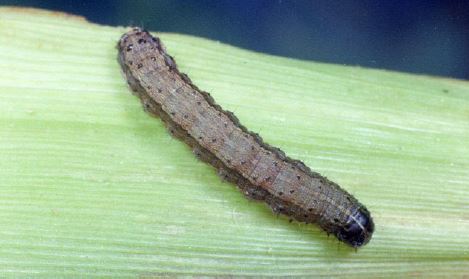Fall armyworm - is it a threat to rice?
 PRODUCTION ADVICE - NOVEMBER 2020 - AGRONOMY
PRODUCTION ADVICE - NOVEMBER 2020 - AGRONOMY
By John Fowler
Extension Agronomist
Ph: 03 5881 9933 | M: 0427 079 138 | E: john.fowler@lls.nsw.gov.au

FAW is mainly a tropical pest and it will not survive winter in NSW. However, it has migrated south, and the most recent confirmed detection (at time of writing) is at Hillston, with a suspected detection at Finley at the end of November. It may already be in the Murray Valley, so we have just begun an active monitoring program to track its progress.
The good news for rice growers is that while FAW can attack rice, it is one of its least preferred summer crops. Maize and sweet corn are its preferred food source (damage to some maize crops in north Queensland has been excessive). However, what we don’t yet know is how damaging it will be to rice if the small maize area locally means it must find an alternative food source.
In summary, we don’t know if FAW will be a significant insect pest of rice in NSW. The main message at this stage is to monitor your crop(s) for the presence of caterpillars. If any are found, contact either the Rice Extension team, a SunRice field officer, Local Land Services agricultural team or your commercial agronomist and inform them of the situation.
A considerable amount of research and monitoring has occurred since FAW was detected earlier this year. Further information is readily available from the NSW Department of Primary Industries and Grains Research and Development Corporation websites. FAW can be a ferocious eater of foliage, but hopefully we will not experience it locally.
Russian wheat aphids
While on the subject of insects in rice, Russian wheat aphids (RWA) have been present on all drill-sown rice crops I have seen this season. Thankfully, they don’t seem to be causing any great concern. We had a similar experience in 2017, but back then there were some crops that required spraying to avoid excessive seedling loss.
The aphids tend to decline in number as the plant grows and as temperatures increase. They tend to be quite small, and growers may not notice their presence unless they are specifically looking for them.
While it is possible for RWA to be one stress too many for seedling rice and therefore require spraying, it is more likely that the hot weather will be adequate to allow crops to outgrow any damage they may cause.